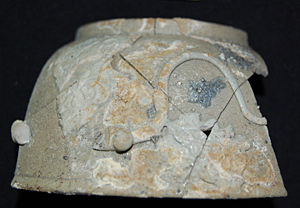
ADVERTISEMENT
2:31 p.m., Dec. 4, 2009----Julie Powers, a junior majoring in history at the University of Delaware, writes about her experiences during her summer internship at the Historic Londontown and Gardens in Annapolis, Md. For more information about the UD History Department and its summer internship opportunities, visit this Web site.
This summer, I was an intern at the Lost Towns Project at Historic London Town and Gardens in Annapolis, Maryland. The Lost Towns Project is a state-run organization that excavates archaeological sites around Anne Arundel County. It was founded to excavate abandoned colonial-era towns and now investigates sites ranging from 500 A.D. to 1800 A.D.
I worked on four sites during the summer. The earliest site was a prehistoric site called Pig Point, which was an early Native American settlement in Anne Arundel County. There we uncovered posts that might be part of the oldest wigwam in Maryland.
I also I worked on another potential Native American site doing STPs -- shovel test pits -- to determine whether there was settlement. We found oyster shells in a midden, or trash pit, native ceramics, and a stone knife.
I also worked in Londontown, a tobacco town settled on the South River in 1683. This town was a major port town until the early 1700s when a law forced all tobacco to be traded through Annapolis. After that, the town slowly disappeared until there was one structure remaining, a brick house still standing. I worked on excavating some of the land in the town, looking for post holes or outlines in the dirt that might tell of a building. I also worked with local students, screening dirt from the dig, looking for artifacts.
My favorite site was the Chew site, near Herrington Bay. We were excavating a 66- by 56-foot brick mansion built around 1690, the largest of its time in Maryland, owned by Samuel Chew. The house burned in 1772 and caved in on itself. We were excavating the cellar where we found a small teacup-sized ceramic colander, my favorite find this summer.
I love being an archaeologist because I enjoying being hands-on with history. When I find an artifact, I love knowing that I am the first person to hold this object in hundreds of years and now it is in my hands to take care of. The days are long and hot, sometimes reaching over 100 degrees as we work screening, hauling dirt and shoveling. Archaeology is not easy work, but the experience of bringing history back to life is incomparable.



